Using Fingertips to Create Happiness
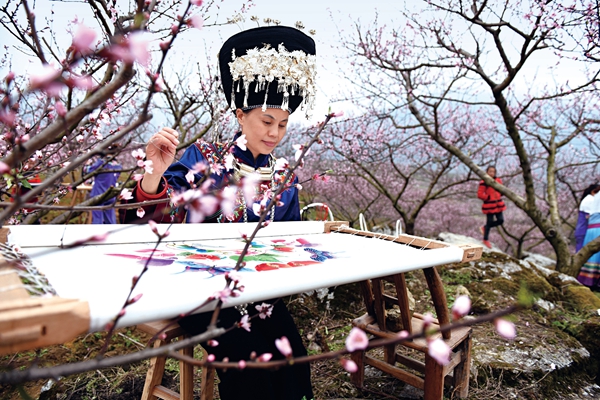
As a seventh-generation inheritor of the craft of making Songtao (a county in southwest China's Guizhou Province) Miao-style embroideries, Shi Liping established Guizhou Songtao Fanjingshan Miao Cultural and Tourist Products Development Co., Ltd., in 2008. Since 2000, Shi has travelled more than 15,000 kilometers to collect historical materials about Miao-style embroideries. The items produced by Shi's company combine the traditional pattern of the flower of the Chinese dove tree with elements of the Miao culture, and elements of modern fashion trends. The company has more than 6,800 embroiderers, most of whom are women.
In Songtao, women learn to weave and embroider, from their mother, at an early age. They even embroider patterns on their wedding dresses. "The embroidering techniques have been passed down … from generation to generation. I have had a great affection for the craft since I was a girl," Shi says. She has spared no effort on her way to becoming an inheritor of the craft of making Songtao Miao embroideries. She has even studied under several masters of the craft.
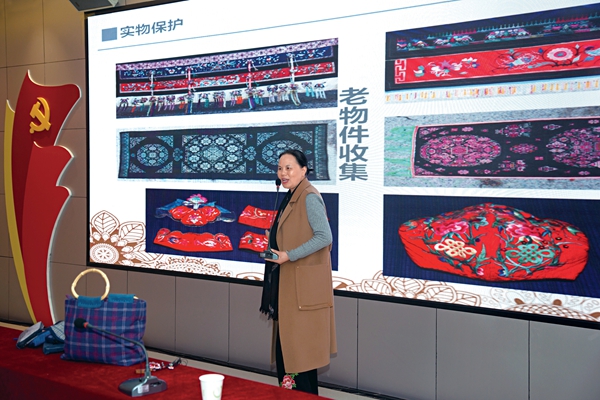
The Songtao Miao people use embroidering, on clothing and adornments, to record their history and culture. The embroideries embody the Miao people's aspiration for beautiful things, and reflect the diversity of the Miao culture.
In December 2008, Shi established Guizhou Songtao Fanjingshan Miao Cultural and Tourist Products Development Co., Ltd. The Chinese dove tree, dubbed a living fossil, mainly grows on Fanjing Mountain, in Guizhou. Shi thinks Songtao Miao-style embroideries and the flower of the Chinese dove tree, her favorite flower, are gifts from Fanjing Mountain. "I hope, despite the change of time, the Miao-style embroideries will always retain their vitality, like the Chinese dove tree," says Shi.
Inheriting, Promoting Craft
Shi has visited many Miao villages across Guizhou, and on the Wuling Mountains, in central China, to collect the traditional embroidering techniques and patterns used by the Miao people. Many of the craftswomen who master the traditional techniques are unable to read and speak Mandarin. So, Shi has videotaped the women as they have embroidered. As some of the techniques have been lost, Shi searched for and found old clothing and adornments with patterns embroidered with those techniques. She then employed embroiderers to restore those items.
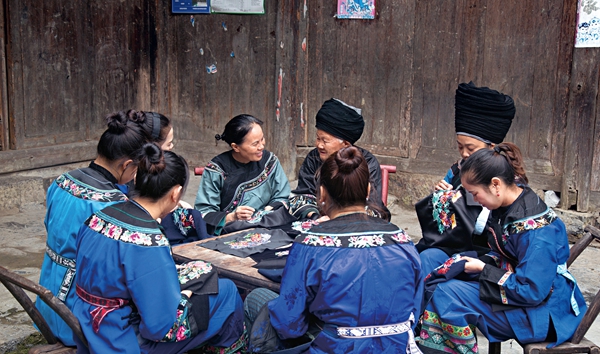
In 2015, a flood in Songtao swept away some of the embroideries Shi had collected. Shi was heartbroken, but she didn't stop collecting. "Now, we can use big data to store pictures of the collected items. A flood can't cause any damage to my collection anymore," says Shi.
Embroidering is an important part of the Songtao Miao's culture, and embroidering is closely connected with Miao people's daily lives. Shi believes the development of embroideries should keep up with the times, and should meet market demands.
Shi has used various elements, such as the flower of the Chinese dove tree and the four-sided drum of the Miao people, in the designs of modern clothing and adornments. Such designs make Miao-style embroideries more fashionable.
"I think the best way to protect and inherit Miaostyle embroideries is to integrate them into daily life. Our products, with both modern and traditional Miao elements, are easy to accept for most people," Shi says. Among her company's wide variety of products are capes, with patterns of pomegranates and the phoenix, sachets — decorated with Miao-style embroideries and filled with herbal medicine — and silver jewelry.
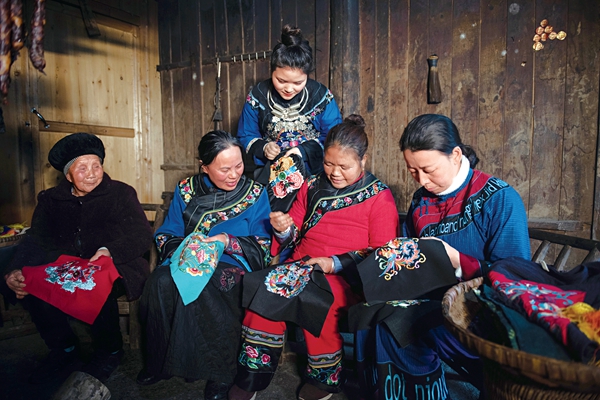
Shi has also developed other products based on Miao culture, including food, films and TV series, and song and dance performances. For embroidery products, there are more than 200 types of patterns, which include those featuring the tattoos of fish and dragons, Fanjing Mountain, and Songtao's customs and folk stories.
Thanks to Shi's efforts, Songtao Miao embroideries have become popular in big cities in China, and they have been exported to many countries and regions.
In May 2011, China's Ministry of Foreign Affairs selected Songtao Miao embroideries, featuring the Miao-style drum dance, to be presented as gifts during diplomatic occasions. In 2013, the United Nations chose Songtao Miao embroideries, featuring the flower of Chinese dove tree, to be presented as gifts during some UN activities.
Path to Happiness
"To protect and inherit an intangible cultural heritage, we must respect it. I want to make good use of the charm of Miao-style embroideries, by developing relevant businesses. The success of these businesses will benefit the inheritance and development of the heritage," Shi says. She has put much effort into helping Miao embroiderers use their techniques to attain wealth. Embroiderers employed by Shi's company work at home, and they are paid on a piecework basis.
Shi Weixian is an embroiderer who returned to Songtao, her hometown, after having worked elsewhere for years. She learned embroidering skills from Shi Liping, and she was recommended by the company to receive further training in Beijing and Guiyang (capital of Guizhou).
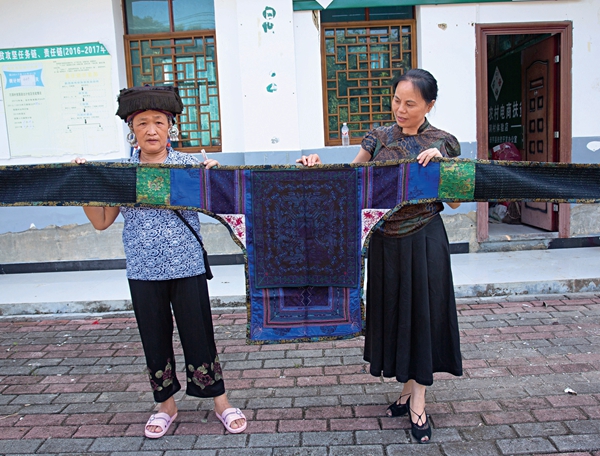
Lu Shunqu, from the village of Zheguyuan, and her sister-in-law work in Shi Liping's company. "We worried the traditional embroidering techniques would be lost after our generation. It's wonderful the techniques can be passed down. I can work and take care of the family at the same time," Lu says, happily.
Shi Liping often visits the embroiderers, in their homes, to discuss techniques, and to learn about the challenges they face in trying to pass their techniques to the next generation. Shi Liping has also recruited women left-behind in Miao villages to make embroideries, and she has sold their works after additional processing.
On May 22, 2020, during the third session of the 13th National People's Congress (NPC), Shi Liping and five deputies, representing various sectors, were interviewed. "In 2008, my company had only three embroiderers; now, we have 4,000 of them. Among the embroiderers are laid-off workers, left-behind women and migrant workers, who returned to their hometown … We have developed the craft of Miaostyle embroideries into a business," Shi Liping said during the interview.
Since she was elected an NPC deputy, in 2018, Shi Liping has called for greater support to be offered to inheritors of intangible cultural heritage. She also proposed the establishment of a research and development center for Miao-style embroideries. The center has been established in Guizhou.
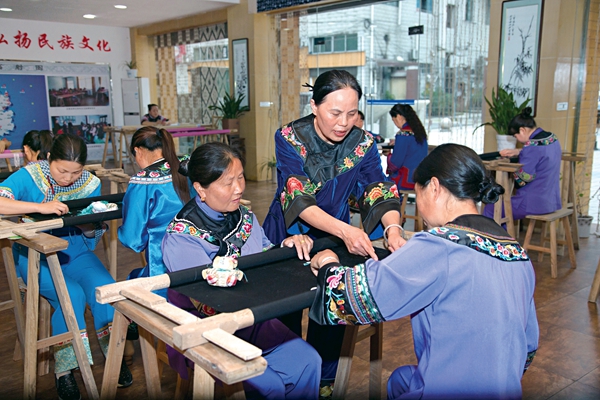
In 2019, Shi Liping's company recorded an annualized output of 60 million yuan (US $8.5 million).
In 2020, the company's sales of embroidered products dropped because of the COVID-19 outbreak. In April that year, Shi Liping registered a shop, to sell Songtao Miao-style embroideries, on Taobao.com. She has also sold her products through live-streaming on several platforms. She has since thought about ways to use various platforms to develop her business.
"The online platforms are like threads that pull together pearls to form a necklace. Customers can find us easily on the platforms. Thus, we are willing to share information and provide services through the platforms," says Shi Liping.
In 2021, the craft of making Songtao Miao-style embroideries was listed among the fifth group of representative items of national-level intangible cultural heritage. Shi Liping became a provincial-level inheritor of the craft.
Rural Revitalization
Shi Liping has a clear plan for cultivating talents to promote the high-quality development of Miao culture. She hopes more young people will fall in love with Miao culture, including Miao-style embroideries, through their participation in cultural inheritance and development.
Shi Liping has given courses in Miao-style embroideries at Guizhou University, Guizhou Normal University and Guizhou Preschool Education College. She teaches embroidering skills, and she shares with students the stories related to Miao-style embroideries. She has also trained many young embroiderers across Guizhou.
Shi Liping believes thriving rural industries will attract young talents to return to their hometowns, and that will benefit rural revitalization.
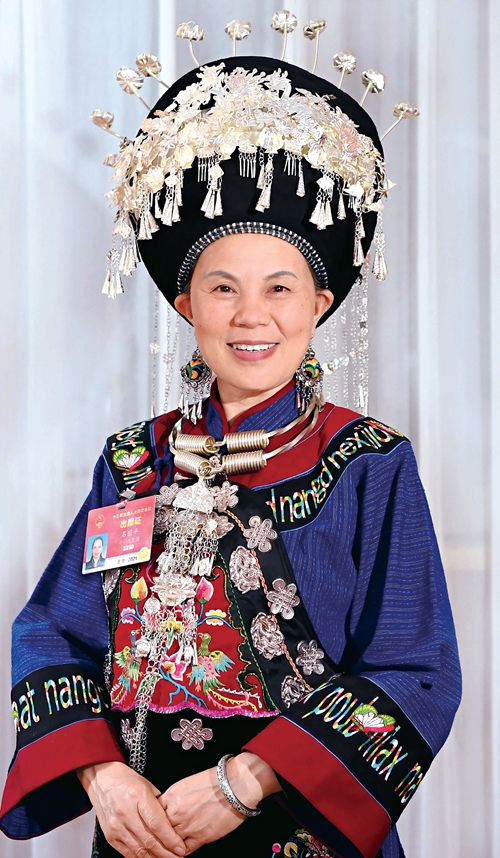
In 2021, her company planted 270 mu (18 hectares) of radix isatidis (a kind of plant) in Baiguo, a village in Songtao. The plant has high economic value. Its roots can be used to make traditional Chinese medicine, and its leaves are used to make a natural dye. Dyeing cloths with the plant will not pollute the water. The plant's stems and leaves regenerate annually.
Prior to the planting of radix isatidis in Baiguo, Shi Liping's company had to buy the dyes needed to make the embroideries. Thanks to good harvests of the plant, the company can now use the natural dye. An industrial chain that involves the weaving and dyeing of cloth and the making of embroideries has been established in Baiguo. Many of the villagers have participated in skills training organized by the company, and then they have taken jobs in relevant industries. As such, their incomes have increased.
Shi Liping has also begun exploring a new development mode — "Miao-style embroideries plus (clothing or tourism)" — to benefit more people.
Given its achievements in supporting women's employment, and in protecting intangible cultural heritage, Shi Liping's company has been named a national demonstration base for women's hand-knitting businesses and a demonstration base for production-oriented intangible cultural heritage protection of Guizhou. Shi Liping has been named a National March 8th Red-Banner Pacesetter and an individual who has stood out in the protection of intangible cultural heritage, and in China's poverty-alleviation campaign.
"The achievements are the results of all people's efforts. I will continue to develop Miao-style embroideries, and I will help more women use their fingertips to create happy lives," says Shi Liping.
Photos Supplied by Interviewee
(Women of China English Monthly July 2023 issue)
Please understand that womenofchina.cn,a non-profit, information-communication website, cannot reach every writer before using articles and images. For copyright issues, please contact us by emailing: website@womenofchina.cn. The articles published and opinions expressed on this website represent the opinions of writers and are not necessarily shared by womenofchina.cn.








.jpg)

 WeChat
WeChat Weibo
Weibo 京公网安备 11010102004314号
京公网安备 11010102004314号